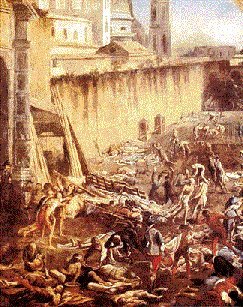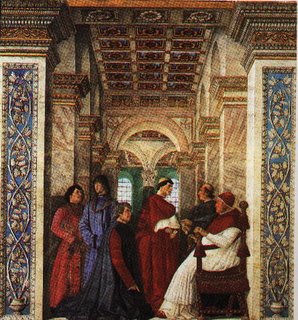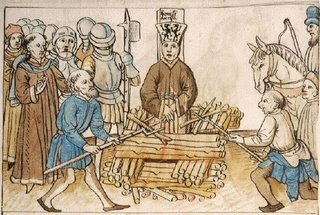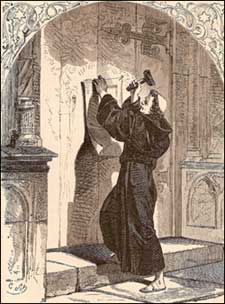 I recently wrote this paper for my Humanities class (antiquity to the 1500s), in defense of Augustine and the sovereignty of God. In light of the circumstance of not having the freedom to state my position on the chosen issue (within the paper), by God's grace, I attempted to use the most explicit Biblical passages and biased sources (towards the Augustinian position) I could without explitly stating "this is my opinion." May God be glorified, and the unchanging truth of His eternal Word forever reign and be esteemed far above fallen man's opinions and attempts to describe and understand such issues.
I recently wrote this paper for my Humanities class (antiquity to the 1500s), in defense of Augustine and the sovereignty of God. In light of the circumstance of not having the freedom to state my position on the chosen issue (within the paper), by God's grace, I attempted to use the most explicit Biblical passages and biased sources (towards the Augustinian position) I could without explitly stating "this is my opinion." May God be glorified, and the unchanging truth of His eternal Word forever reign and be esteemed far above fallen man's opinions and attempts to describe and understand such issues.
“It was by the evil use of his free-will that man destroyed both it and himself.”
[1]Does man, in and of himself, have the ability to choose that which is good, namely, a relationship with the God of historic Biblical Christianity? Or, is man constrained by a tainted will, and dead in his trespasses and sins as a son or daughter of Adam, in which he can only choose evil? This debate is not new. In fact, it can be traced back nearly as far as the beginnings of early Christianity itself. As J.I. Packer and O.R. Johnston explain, the crucial issue behind these two worldviews is “whether God is the author, not merely of justification, but also of faith.”
[2] The two forerunners that vehemently took up the task of arguing this issue were Aurelius Augustinus and Pelagius. Though they argued in opposition of each other nearly 1600 years ago, the fruits of their worldviews are still actively debated upon to this day. To dissect Augustinianism and Pelagianism, it most vital to understand first, who Augustine and Pelagius were, second, central differences between the two theological world and life views, next, the history of the controversy between the two, and most important, what Scripture says concerning the sovereignty of God and will of man. Without Scriptural reference as the foundation of these arguments, they will not last, but indeed collapse as a result of trying to define God’s plan of salvation using human reason instead of what is explicitly stated within Scripture.
Aurelius Augustinus,
[3] otherwise known as Augustine, was born in 354 AD.
[4] He was born into a rather uncultured, poor family in Roman North Africa.
[5] Augustine’s father was a pagan, and his mother, Monica was a Christian who encouraged him to receive a classical education to enhance his faith.
[6] Before Augustine was converted to Christianity, he studied rhetoric in Carthage, in which he became involved with the Manicheans.
[7] This 3rd century cult of the Iranian philosopher Mani, consisted of dualistic Gnosticism that stressed knowledge as the way to salvation.
[8] Through his journey of struggling to find intellectual and spiritual truth, Augustine was converted to Christianity in 386 and baptized in Milan by Ambrose in 387, after reading Paul’s letter to the Romans.
[9] In 391, he was ordained as priest (and later, Bishop) of Hippo which is in current day Annaba, Algeria.
[10] Augustine contributed to the body of Christ as, not only an adamant “defender of orthodox Christianity”
[11] and significant church father, but also as a renowned author of various pieces that have circulated throughout Christendom for centuries.
[12] Some of his works include
The Confessions, The City of God, On the Trinity, Enchiridion—a systematic theology,
Retractationes, Commentaries (John, Psalms), and many theological letters and treatises—most important in this context is his Pelagian treatise.
[13] Augustine worked on this significant refutation for over 10 years, starting in 412, and finishing in 430.
[14] After years of defending the Christian faith, and emphasizing the essential doctrines of grace, Augustine passed away in 430 AD.
[15]In 354 AD, Pelagius—the theological opponent of Augustine, was born in Britain.
[16] Later in his life, Pelagius became a monk and eunuch as a result of feeling called to help the church pursue “virtue and moral perfection.”
[17] He initially lived as an ascetic and sought after salvation through self-denial. This was a direct reflection of the growth of monasticism and Antinomianism in his day and, though he did not live as fanatically as the hermits, his habits were saturated in legalism.
[18] Pelagius later taught in North Africa, Palestine, and Rome before the fall of 410 AD, and had gained a following of converts.
[19] [20] Three converts to his teachings include Coelestius, Rufinius the Syrian and Julian of Eclanum.
[21] Julian, the most belligerent towards the arguments against Pelagius, was also the most educated of the three. However, out of all of them, Coelestius remained the leading activist regarding Pelagius’ causes.
[22] In fact, the very beginnings of the Pelagian controversy began with Coelestius between the years 411 and 412 AD. Through his central teachings on man’s ability to choose God out of his own will, Pelagius severely roused many within Christendom during the early 5th century. Through he adamantly promoted his agenda of free will, his recantations and denunciations of, not only his disciples’ teachings, but of his own, left his credibility damaged. Pelagius wrote
De Natura and
De Libero Arbitrio to re-establish his beliefs and to clarify his worldview to his previous supporters.
[23] In 418, Pelagius and Coelestius were condemned at the Council of Carthage, and despite the council’s establishment of various canons in opposition of Pelagianism, Julian of Eclanum persisted to defend Pelagius’ teachings. In fact, Augustine’s final refutations against Pelagianism were directed towards Julian’s ambitions in defense of Pelagius. The finals days of Pelagius are debated upon among scholars, as is the date of his birth and death. However, if Pelagius passed away around 435 AD as various evangelical scholars allude to, it is a possibility that he accompanied his faithful disciples, Coelestius and Julian to Constantinople in 429 AD, and remained there until his death.
[24] [25]The central differences between the two theological world and life views of Augustine and Pelagius can be best described in terms of their views on sin, the responsibility of man, the doctrines of grace and election, predestination, and the will of man. Augustine firmly believed in original sin. He alluded to Romans 5:12 to explain the traducianism view (human body and soul are passed on from parent to child)
[26] of Adam’s fall into sin being passed on to all men born through sexual relations, thus excluding Christ.
[27] Augustine’s view towards the moral state of man was that man is totally depraved. He viewed each man as dead both spiritually and morally (dead in mind and will; Ephesians 2:1-3, 5, Colossians 2:13, Romans 8:6-8). Pelagius on the other hand, believed that Adam was not good or evil and that after the fall, Adam’s ability to choose was not affected, but his future was simple changed. He ultimately believed that Adam was “morally neutral”.
[28] Pelagius thought that Adam’s sin did not affect the human race, and thus, exposed his disbelief in original sin. He believed that all humans are born like Adam (“morally neutral”), and men sin because they copy other men’s examples. The epitome of his argument rested in that he believed that men are created with no more sin, desire to sin, or guilt than Christ had.
[29] In regards to man’s responsibility, Augustine saw man as incapable of instigating any pure deeds towards God because of his deadness (Romans 3:11). He believed the only good man can externally carry out is with motives that are impure, and thus, contaminated with sin. His still emphasized men’s responsibility to God, despite their wretched state of deadness,
[30] and that man is responsible not because of his ability to obey, but simply because God has said so (Acts 17:30-31, 1 Corinthians 2:14, John 12:37-38). Pelagius viewed the responsibility of man in terms of man’s abilities. He believed that the responsibility of man makes him able, thus grace is bestowed to make what man is already capable of doing, easier for him to accomplish.
[31] Regarding the doctrines of grace and election, Augustine initially believed that man and God played a dual part in the doctrine of grace (man asked, God gave), but later he renounced this idea. He believed that grace was unmerited favor, thus undeserved in totality and granted freely to sinners. He also believed in God’s sovereign choosing of “elected” sinners to be saved by grace. Augustine viewed the sovereign will of God as the determiner of election, and not faith that is foreseen in the sinner.
[32] He believed that God chooses men to be saved, and thus the only way a sinner is able to choose God is based on an act of God in the sinner’s will to do so (he is otherwise unable to choose God
[33] John 6:44, Jonah 2:9, 1 Corinthians 1:26-31, Romans 8:31-34). Augustine believed that because of God’s promised grace for the elect, recipients of God’s grace will be given the ability to persevere until the end, thus there is no concept of losing salvation in his worldview.
[34] Pelagius’ beliefs concerning the doctrines of grace and election are rooted in views of man’s ability to choose God. He viewed grace in terms of being available to all, resistible, and able to be lost, thus, that man can lose his salvation.
[35] Pelagius did not believe in God’s choosing of the elect, but that God responds to man’s initiation. Pelagius viewed the atonement of Christ as the prime example for man to follow in terms of morality. He explained that following this example keeps man from sin and saves him, thus grace is not necessary, but a modality to make that which man is able to do, easier. Pelagius believed that God has foreknowledge that man would choose Him.
[36] Concerning predestination, Augustine staunchly believed in the sovereignty of God, and God’s unconditional predestination to every aspect of life. Regarding theodicy, Augustine was gradual in its application toward the doctrine of predestination. Though he considered sin to be the deficiency of good (good retaining substance, evil existing as a shadow—somewhat reflecting his past Manichaeistic influence), he believed that sin is apart (not outside) of God’s predestined plan. He also lingered over the idea of preordained paths concerning the non-elect (reprobation). Pelagius’ view of predestination is de-emphasized in his idea of man’s free will. He put the importance of salvation on the merits of man, thus the only shadow of predestination in the Pelagian world and life view was the belief in God’s foreknowledge. Regarding the will of man, the beliefs of Augustine are best exemplified in his famous maxim, “give what thou commandest and command what thou wilt.”
[37] Augustine stressed that the only thing man is capable of is sin, and that he only worsens his sinful state when he tries to will anything.
[38] Pelagius’ view of the will of man is also best understood through his famous maxim, “If I ought, I can.” He viewed man as having a free will to sin and not to sin. As he himself stated, “Our victory over sin and Satan proceeds not from the help which God affords but is owing to our own free will…”
[39] Therefore, the Pelagian view is founded on the idea of man having a free will to choose good, evil, and even God.
The history of the controversy between Augustine and Pelagius begins with Coelestius, a faithful convert of Pelagius. He was accused by Paulinius on account of not supporting the ability of infant baptism to cleanse sin. Coelestius was excommunicated by the Synod of Carthage on account of his beliefs. Over the next four years, Pelagian teaching caused a stir within various branches of the Church. In 415, some of Pelagius’ writings were condemned by a Palestinian synod, and he was asked to recant his teachings concerning the idea of sinless man, and his negation of man’s need for grace.
[40] Upon his confessions and recantations of his own teachings, and the teachings of Coelestius, Pelagius was thereby declared orthodox. His supporters, on the other hand, were left in confusion. In 416, two more synods occurred in North Africa, both re-condemning Pelagianism. Letters were sent from various Bishops (including Augustine) to Pope Innocent informing him of the events.
[41] He reacted to the condemnation of Pelagianism by stating, “We declare in virtue of our Apostolic authority that Pelagius and Coelestius are excluded from the communion of the Church until they deliver themselves from the snares of the devil.”
[42] In 417, Zosimus took the position of Pope, and was won over by the piety of Pelagius and Coelestius. In 418, two hundred bishops met at Carthage to discuss the matter, forming a general council, whereby the establishments of various canons in opposition to Pelagianism were convened.
[43] Pope Zosimus recanted from his previous position in support of Pelagius, and appealed that all bishops adhere to the council’s canons.
[44] Julian of Eclanum refused, and thus remained in support of the teachings of Pelagius.
[45] Zosimus’ successor, Boniface, requested that Augustine write a refutation to Julian, which he did, until his death in 430 AD. After being removed from the Church, Julian, along with Coelestius, and possibly Pelagius himself, withdrew to Constantinople in 429.
[46] A year after Augustine’s death in 430, the council of Ephesus condemned Pelagianism once again.
[47] Historically, one can see that the teachings of Pelagius have been deemed by the Church as little more than heresy in its most severe form.
Most important in the context of the Augustinian and Pelagian worldview is what Scripture has to say concerning the two. On the basis of God’s word alone do these two arguments stand or fall, and not the other way around. If the foundation for one of these arguments is based solely on human reason or logistics and not the Bible, the argument is useless (1 Corinthians 1:20-21, 1 Corinthians 3: 18-20, Colossians 2:8). Trying to prove the doctrines of the Bible without using the Bible or contradicting what is written within the Scriptures exemplifies an unsupported argument. Though the basic Augustinian doctrines are indeed found in abundance throughout Scripture (contrary to Pelagian doctrines), in the interest of time and limitations of space for this paper, only one verse concerning the responsibility of man, the doctrines of grace and election, predestination, and the will of man will be mentioned. Regarding what man’s responsibility is, scripture says in Acts 17:30-31, “Therefore having overlooked the times of ignorance, God is now declaring to men that all people (not in the Greek) everywhere should repent, because He has fixed a day in which He will judge the world in righteousness through a Man whom HE has appointed, having furnished proof to all men by raising Him from the dead” (NASB).
[48] The justice of God demands sin and sinners to be punished, thus man is remains responsible for his sin, but is incapable of appeasing the wrath of God except through Christ, or by spending eternity in hell. Concerning the doctrines of grace and election, the Bible says in Ephesians 2:8-9, “For by grace you have been saved through faith, and that not of yourselves, it is (not in the Greek) the gift of God; not as a result of works, so that no one may boast” (NASB).
[49] Also, concerning election, Ephesians 1:4 says, “…just as He chose us in Him before the foundation of the world, that we would be holy and blameless before Him” (NASB).
[50] In the Greek, the verb behind “chose” denotes that God chooses by Himself and for Himself for His ultimate glory. Thus, these passages indicate that God elects sinners, and saves them by His grace. In terms of predestination, scripture explains in Ephesians 1:5 that, “He predestined us to adoption as sons through Jesus Christ to Himself, according to the kind intention of His will, to the praise of the glory of His grace, which He freely bestowed on us in the Beloved” (NASB).
[51] This verse implies that the salvation of redeemed sinners is something that God had preordained for His glory. Lastly, regarding the will of man, the Bible says in Romans 9:15-16, “For He says to Moses, ‘I will have mercy on whom I have mercy, and I will have compassion on whom I have compassion.’ So then it does not depend on the man who wills, or on the man who runs, but on God who has mercy” (NASB).
[52] Also, Paul says in Romans 7:18, “For I know that nothing good dwells in me, that is, in my flesh; for the willing is present in me, but the doing of the good is not” (NASB).
[53] These passages describe the will of man, in terms of salvation and goodness, to be absolutely non-existent. Salvation is not dependent on man’s will, but rather on God’s mercy, and even for regenerate believers, the will is still tainted with sin, and the only good in man is imputed from God. Augustine, though he held firmly to the sacraments and later rejected some of his initial convictions, believed, wrote about, and taught what the scriptures convey concerning the responsibility of man, the doctrines of grace and election, predestination, and the will of man.
Despite the fact that this ancient debate occurred nearly 1600 years ago, the very doctrines that Augustine and Pelagius wrestled with in opposition to each other are the very issues which have raged throughout all of Christendom for centuries. The doctrines concerning the responsibility of man, of grace and election, predestination, and the will of man are vital, and what one believes concerning these issues is dependent upon who they believe is ultimately responsible for salvation—God or man. Augustinianism and Pelagianism is thus founded on this underlying question: does man have the free will to choose God, or is man spiritually and morally dead, thereby, unable to choose God, apart from predetermined election? Scripture, as always, is sufficient in undoubtedly and explictly showing the answer to this age old question.
[1] Sproul, R.C., Ph.D., Willing to Believe: the Controversy over Free Will. Grand Rapids, MI: Baker Books, 1997. (pg. 47)
[2] Sproul, R.C., Ph.D., ibid. (pg. 13)
[3] Chadwick, Henry. Augustine. Oxford: Oxford UP, 1986. (pg. 1-2)
[4] Chadwick, Henry., ibid. (pg. 1-2)
[5] Chadwick, Henry., ibid. (pg. 1-2)
[6] Curt, Daniel, Ph.D. The History and Theology of Calvinism. Springfield: Good Books, 2003.
[7] Gilson, Etienne. The Christian Philosophy of Saint Augustine. New York: Octagon Books, 1988. (pages 227-228)
[8] Grenz, Stanley J., David Guretzki, and Cherith Fee Nordling. Pocket Dictionary of Theological Terms. Downers Grove, IL: InterVaristy Press, 1999. (pg. 75)
[9] Buckler, John, Hill, and McKay. A History of Western Society: From Antiquity to 1500. New York: Houghton Mifflin, 2006. (pg. 202)
[10] Chadwick, Henry., ibid. (pg. 1-2)
[11] Buckler, John, Hill, McKay., ibid. (pg. 202)
[12] Curt, Daniel, Ph.D., ibid.
[13] Curt, Daniel, Ph.D., ibid.
[14] Sproul, R.C., Ph.D., ibid. (pg. 51)
[15] Chadwick, Henry., ibid. (pg. 1-2)
[16] Sproul, R.C., Ph.D., ibid. (pg. 33)
[17] Sproul, R.C., Ph.D., ibid. (pg. 33)
[18] Curt, Daniel, Ph.D., ibid. (pg. 13)
[19] Sproul, R.C., Ph.D., ibid. (pg. 33)
[20] Curt, Daniel, Ph.D., ibid. (pg. 13)
[21] Sproul, R.C., Ph.D., ibid. (pg. 33)
[22] Sproul, R.C., Ph.D., ibid. (pg. 33)
[23] Sproul, R.C., Ph.D., ibid. (pg. 43)
[24] Curt, Daniel, Ph.D., ibid. (pg. 13)
[25] Sproul, R.C., Ph.D., ibid. (pgs. 35, 45)
[26] Grenz, Stanley J., ibid. (page 115)
[27] Curt, Daniel, Ph.D., ibid.
[28] Curt, Daniel, Ph.D., ibid. (page 13)
[29] Curt, Daniel, Ph.D., ibid. (page 13)
[30] Curt, Daniel, Ph.D., ibid.
[31] Curt, Daniel, Ph.D., ibid. (page 13)
[32] Curt, Daniel, Ph.D., ibid.
[33] Curt, Daniel, Ph.D., ibid.
[34] Curt, Daniel, Ph.D., ibid.
[35] Curt, Daniel, Ph.D., ibid. (page 13)
[36] Curt, Daniel, Ph.D., ibid. (page 13)
[37] Curt, Daniel, Ph.D., ibid.
[38] Curt, Daniel, Ph.D., ibid.
[39] Curt, Daniel, Ph.D., ibid.
[40] Sproul, R.C., Ph.D., ibid. (pg. 43)
[41] Sproul, R.C., Ph.D., ibid. (pg. 43)
[42] Sproul, R.C., Ph.D., ibid. (pg. 43)
[43] Sproul, R.C., Ph.D., ibid. (pg.44)
[44] Sproul, R.C., Ph.D., ibid. (pg. 44)
[45] Sproul, R.C., Ph.D., ibid. (pg. 44-45)
[46] Sproul, R.C., Ph.D., ibid. (pg. 45)
[47] Sproul, R.C., Ph.D., ibid. (pg. 45)
[48] The Lockman Foundations. Holy Bible: New American Standard Bible Updated Edition. Anaheim, CA: Foundation, 1995.
[49] The Lockman Foundations. Holy Bible: New American Standard Bible Updated Edition. Anaheim, CA: Foundation, 1995.
[50] The Lockman Foundations. Holy Bible: New American Standard Bible Updated Edition. Anaheim, CA: Foundation, 1995.
[51] The Lockman Foundations. Holy Bible: New American Standard Bible Updated Edition. Anaheim, CA: Foundation, 1995.
[52] The Lockman Foundations. Holy Bible: New American Standard Bible Updated Edition. Anaheim, CA: Foundation, 1995.
[53] The Lockman Foundations. Holy Bible: New American Standard Bible Updated Edition. Anaheim, CA: Foundation, 1995.



 and Genoese shipping and long-distance trade. Not only did foreign goods arrive from the trading
and Genoese shipping and long-distance trade. Not only did foreign goods arrive from the trading  ships to these two growing regions, but a carrier of one of the most deadly diseases ever to touch the people of Europe...the fleas infected with Pasteurella Pestis, also known as the Bubonic Plague.
ships to these two growing regions, but a carrier of one of the most deadly diseases ever to touch the people of Europe...the fleas infected with Pasteurella Pestis, also known as the Bubonic Plague. ope on the backs of vagabond rats. The seemingly harmless rodents scurried their way off the newly arrived ships, only to infect an already unstable land, dominated by feudalism.
ope on the backs of vagabond rats. The seemingly harmless rodents scurried their way off the newly arrived ships, only to infect an already unstable land, dominated by feudalism.
 Image this. People are dropping like flies from not only a terrible plague, but also, as a result of a vicious war. The clergy offered very little solace to the growing discontentment of the people. One such massive event, The Great Schism (1309-1376), weakened the reputation of the Roman Catholic Church more than any previous event. At this time, the Church elected three different Popes, all ruling with Papal authority from three different areas--Rome, France, and Pisa. Excommunication of one another was their only tool, thus you can image how the common man felt in regards to "Church authority"...they viewed such previous institutions of "authority" as anything but competent. Along with ever transparent corrutption, this inability to handle authority greatly weakened the Roman Catholic Church's reputation among the common people.
Image this. People are dropping like flies from not only a terrible plague, but also, as a result of a vicious war. The clergy offered very little solace to the growing discontentment of the people. One such massive event, The Great Schism (1309-1376), weakened the reputation of the Roman Catholic Church more than any previous event. At this time, the Church elected three different Popes, all ruling with Papal authority from three different areas--Rome, France, and Pisa. Excommunication of one another was their only tool, thus you can image how the common man felt in regards to "Church authority"...they viewed such previous institutions of "authority" as anything but competent. Along with ever transparent corrutption, this inability to handle authority greatly weakened the Roman Catholic Church's reputation among the common people.
 e. In God's perfect planning, such a man is now hailed as the precursor to the 16th Century Reformation, because of his flamboiant challenges to the corrupt, oppressive structures of the Roman Catholic Church. Jan Hus (1369-1415) likewise, stood for the ideas exhibited by Wyclif. Hus was later burned at the stake for accepting such reformatory ideas, along with many of those who followed, called Lollards (followers of Wyclif).
e. In God's perfect planning, such a man is now hailed as the precursor to the 16th Century Reformation, because of his flamboiant challenges to the corrupt, oppressive structures of the Roman Catholic Church. Jan Hus (1369-1415) likewise, stood for the ideas exhibited by Wyclif. Hus was later burned at the stake for accepting such reformatory ideas, along with many of those who followed, called Lollards (followers of Wyclif). f the Renaissance and the Reformation (15-16th centuries), growing acceptance of humanism and desire to return to the "Golden Age of Greece" pushed many into the production and spread of unBiblical ideas
f the Renaissance and the Reformation (15-16th centuries), growing acceptance of humanism and desire to return to the "Golden Age of Greece" pushed many into the production and spread of unBiblical ideas  found in such works as Thomas More's Utopia, Petrarch's reproductions of the works of Cicero, Alberti's On the Family, and Pico's Oration on the Dignity of Man. However, this gradual rise in literacy ultimately allowed, by the grace of God, for one of the most important events in all of Western Christendom...God's usage of Martin Luther in bringing about absolute Reformation of the Church.
found in such works as Thomas More's Utopia, Petrarch's reproductions of the works of Cicero, Alberti's On the Family, and Pico's Oration on the Dignity of Man. However, this gradual rise in literacy ultimately allowed, by the grace of God, for one of the most important events in all of Western Christendom...God's usage of Martin Luther in bringing about absolute Reformation of the Church.
